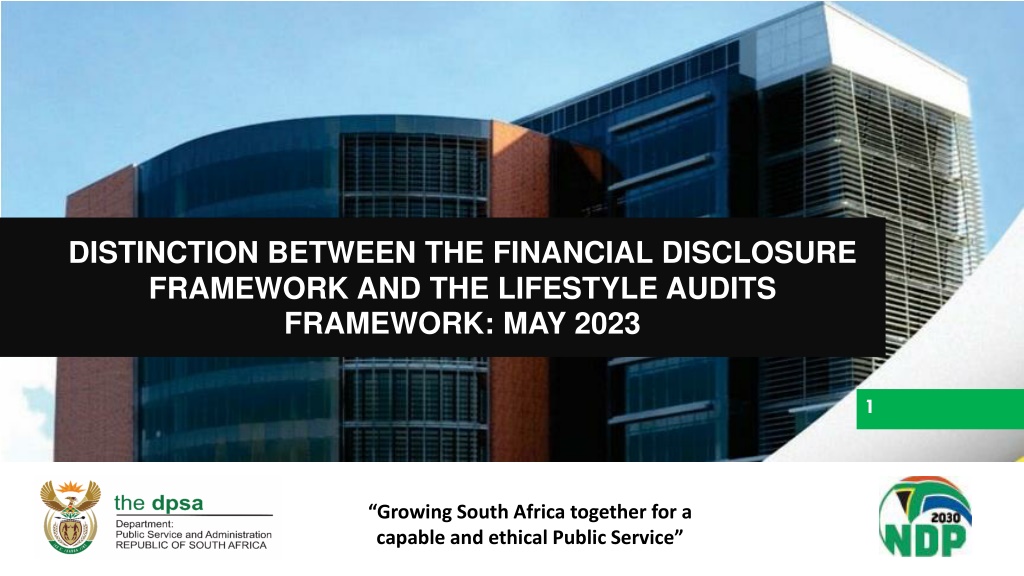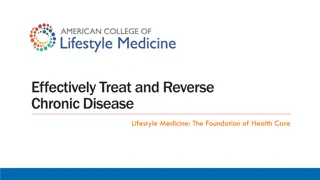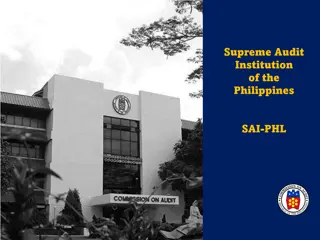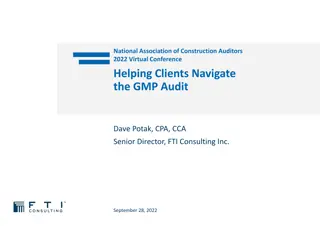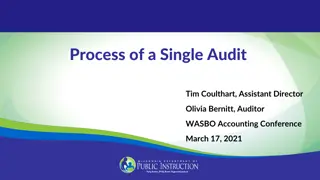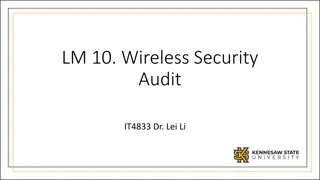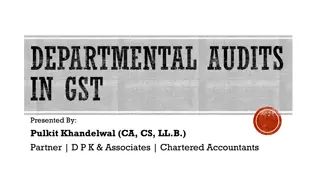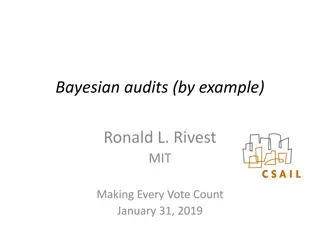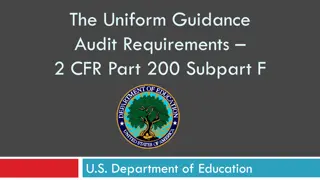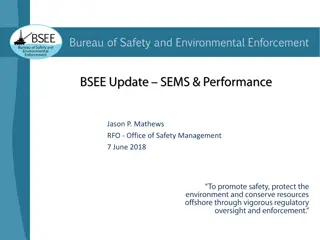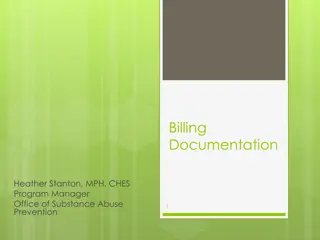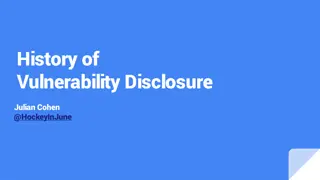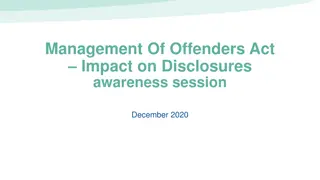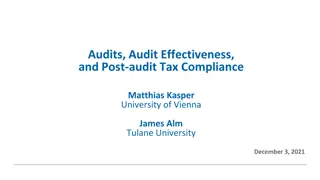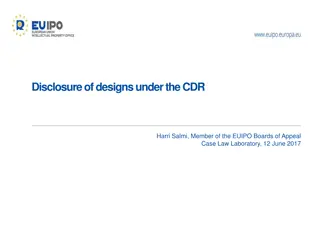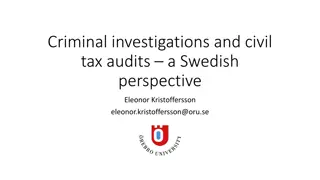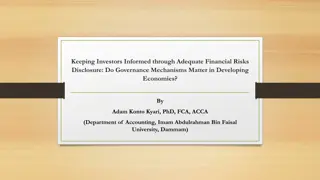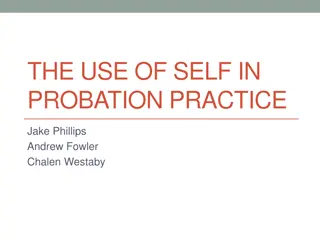Understanding Financial Disclosure and Lifestyle Audits Frameworks
The financial disclosure framework was introduced in 2016 by the Minister for the Public Service and Administration to manage conflict of interest situations in the public service. Designated employees disclose their financial interests annually via the eDisclosure system, and these disclosures are verified by Ethics officers to promote transparency and ethical conduct. Lifestyle audits aim to assess employees' lifestyles against their known income sources to detect potential corruption or illicit activities.
Download Presentation

Please find below an Image/Link to download the presentation.
The content on the website is provided AS IS for your information and personal use only. It may not be sold, licensed, or shared on other websites without obtaining consent from the author. Download presentation by click this link. If you encounter any issues during the download, it is possible that the publisher has removed the file from their server.
E N D
Presentation Transcript
DISTINCTION BETWEEN THE FINANCIAL DISCLOSURE FRAMEWORK AND THE LIFESTYLE AUDITS FRAMEWORK: MAY 2023 1 Growing South Africa together for a capable and ethical Public Service
Aim of presentation Aim of presentation To brief the Portfolio Committee on the distinction between the Financial Disclosure Framework and the Lifestyle Audits Framework and its intent and purposes in the Public Service. Growing South Africa together for a capable and ethical Public Service
Financial Disclosure Framework Financial Disclosure Framework When introduced? In 2016, the Minister for the Public Service and Administration (MPSA) issued the Public Service Regulations (PSR, 2016). Chapter 2 of the PSR concerns the conduct of employees in the public service, and covers the financial disclosure framework and anti-corruption and ethics functions. The inclusion of financial disclosures was also in response to a requirement in the United Nations Convention Against Corruption (UNCAC), as South Africa is a signatory thereof. What is the purpose? To manage conflict of interest situations in the public service (as per UNCAC). To encourage public service employees to be transparent. Growing South Africa together for a capable and ethical Public Service
Financial Disclosure Framework Financial Disclosure Framework What does it entail? In terms of the adopted regulations, designated employees such as members of the Senior Management Service (SMS), heads of department (HOD) and any other employee or category of employees determined by the MPSA, disclose their financial interests via the electronic system (eDisclosure). SMS members and HODs disclose in April each year. Other categories of employees (MMS 11&12 OSD 11&12, ASD 9&10, OSD 9&10 SCM & Finance employees) disclose in June and July every second year. They are required to disclose: shares, loan accounts, income-generating assets, trusts, directorships and partnerships, other remunerated work, consultancies and retainerships, gifts and hospitality, ownership in immovable property and vehicles. Growing South Africa together for a capable and ethical Public Service
Financial Disclosure Framework Financial Disclosure Framework Cont. These financial disclosures are then verified by the Ethics officer(s) in a department, using the database linked to the eDisclosure system (Deeds, CIPC, eNatis, internal registers). Intention? To promote and maintain a high level of professional ethics (as per the Constitution, section 195) by encouraging transparency. To manage any conflict of interest situation that is identified through the disclosure of financial interests. To institutionalise the Code of Conduct by assessing compliance with the relevant prescripts governing the conduct of designated employees in the public service (such as other remunerative work and gifts). Growing South Africa together for a capable and ethical Public Service
Lifestyle Audits Framework Lifestyle Audits Framework When introduced? In 2018 the President of the Republic of South Africa, announced that lifestyle audits must be compulsory for all government employees, including public service employees. In 2020/2021, the DG:DPSA approved a Framework and Strategy for implementing lifestyle audits in the public service. On 1 April 2021, the MPSA approved a Guide to implement lifestyle audits in the public service to be implemented by all Public Service departments, which made lifestyle audits compulsory. This gave effect to Regulation 22 of the PSR, 2016. This also addressed the requirement in the UNCAC regarding conflicts of interest. Growing South Africa together for a capable and ethical Public Service
Lifestyle Audits Framework Lifestyle Audits Framework What is the purpose? To manage conflicts of interests situations in the public service (as per UNCAC). To strengthen risk management in departments focusing on corruption and ethics. To address unexplained wealth amongst public service employees. To deter corrupt behaviour. To strengthen ethical conduct. Growing South Africa together for a capable and ethical Public Service
Lifestyle Audits Framework Lifestyle Audits Framework What does it entail? Lifestyle audits were introduced as part of the PSR, 2016, to be a legitimate mechanism for HODs to analyse ethics and corruption risks as part of the department s system of risk management. Lifestyle audits are a decentralised function, carried out by departments based on their risk profiles. The information on the eDisclosure system is verified (lifestyle review) and then used to determine if an employee is living beyond his or her means, and to determine if there are any conflicts of interest that may point to corrupt activities. If such is determined, a case is opened with the Police for investigation (lifestyle investigation). If the source of unexplained wealth could not be determined, the assistance of an auditor is obtained to assist (lifestyle audit). Growing South Africa together for a capable and ethical Public Service
Lifestyle Audits Framework Lifestyle Audits Framework Intention? To determine if employees: live within their financial means; can explain other sources of income received; and do not feed their lifestyles with the proceeds of crime. Thus, to build an ethical public service, with professional employees who focusses on service delivery and not self enrichment. Growing South Africa together for a capable and ethical Public Service
Conclusion Conclusion How does lifestyle audits feed from and into the FD Framework? Both are measures aimed at strengthening the conduct of public service employees to give effect to section 195 of the Constitution (professionalization). Both focused on identifying conflicts of interest: The eDisclosure system is primarily focussed on collecting information to assess possible and actual conflicts of interest, such as receiving of gifts and performance of other remunerative work. Lifestyle audits go one step further, by using the information on the eDisclosure system to perform a risk assessment to identify if employees are living beyond their means. In the process, conflicts of interest are evaluated to determine if it contributed to unexplained wealth, such as conducting business with the State. As such, financial disclosures are the backbone of lifestyle audits, where it is used to identify criminal conduct. Both are part of Government s Anti-Corruption system to address conflicts of interest and corruption risks; others include: vetting and integrity testing. Growing South Africa together for a capable and ethical Public Service
Conclusion Conclusion To assist the new categories to submit Financial Declarations, the DPSA identified departments with challenges and provided them with workshops. A Guide was also adopted and departments are assisted during the submission period to register their members on the eDisclosure system). Departments are advised to discipline officials that fail to declare their interests. If not done, the DPSA forwards a non-compliance letter to the relevant department, and in some instances a Minister-to-Minister letter to request disciplinary steps to be taken. Departments who still have not initiated lifestyle audits were identified for further training on implementing the Guide. Recently a lifestyle investigation course was developed to improve investigations and the SIU is engaged to select departments to perform LSA on their behalf. More departments started to perform lifestyle audits, with an improvement seen in the detection of conflicts of interest and the referral of cases for investigations. Growing South Africa together for a capable and ethical Public Service
